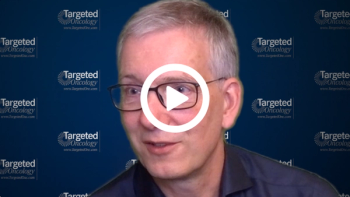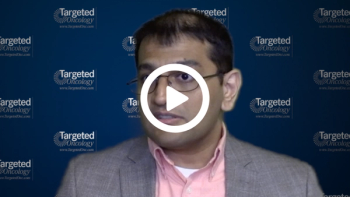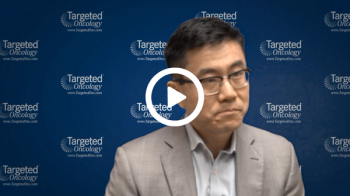
A lower risk of disease recurrence was seen when combining anthracycline and chemotherapy to treat certain patients with breast cancer.

Your AI-Trained Oncology Knowledge Connection!


A lower risk of disease recurrence was seen when combining anthracycline and chemotherapy to treat certain patients with breast cancer.

Protocol amendment with sacituzumab govitecan shows promising responses, but questions remain for the use of the therapy in patients with bladder cancer.

Results from the AURA trial show the survival benefits of cisplatin-based chemotherapy in combination with avelumab.

Improved results were seen with subcutaneous amivantamab vs its intravenous formulation in patients with refractory EGFR-mutated, advanced non-small lung cancer had improved responses with low rates of adverse effects with subcutaneous amivantamab vs its intravenous formulation.

The small molecule inhibitor selectively targeting HIF-2α DFF332 shows promising preliminary activity and favorable safety in patients with advanced clear cell renal carcinoma.

Combining encorafenib/binimetinib before nivolumab/ipilimumab did not improve progression-free survival in BRAF V600E/K+ metastatic melanoma.

Frontline amivantamab plus lazertinib reduced the risk of disease progression or death by 30% versus osimertinib in patients with high-risk EGFR-mutant non–small cell lung cancer.

Peter Borchmann, MD, discusses the main takeaways from the GHSG HD21 study presented at the 2024 ASCO Annual Meeting.

Over 8 years, dabrafenib and trametinib showed improved survival vs placebo in stage III melanoma, but overall and melanoma-specific benefits were not statistically significant.

The highest efficacy was observed in CP-CML patients harboring a BCR::ABL1 T315I mutation who received ponatinib at 45 mg daily.

The latest data on the combination of pelabresib and ruxolitinib in myelofibrosis may provide the rationale for a paradigm shift.

Puneeth Indurlal, MD, MS, discusses the implications of assessing for patients' health-related social needs during the course of cancer treatment at the 2024 ASCO Annual Meeting.

Lorlatinib improved progression-free survival vs crizotinib when used as a treatment in patients ALK-positive non–small cell lung cancer.

Halle Moore, MD, discusses key takeaways from a study on young patients with breast cancer carrying BRCA mutations presented at the 2024 ASCO Annual Meeting.

Valentina Ardila, MD, encouraged further research to understand the complex interplay between obesity, immune response, and transplant outcomes.

According to findings from a retrospective analysis, young adults under 40 years of age who received a human papillomavirus vaccination had lower rates of HPV-related cancer.

A study offers promising news for young women with early-stage breast cancer who want to have children after treatment, showing that 73% of breast cancer survivors who attempted pregnancy were successful.

A study has shown artificial intelligence virtual navigation to be a promising tool to improve colonoscopy completion rates, with high patient acceptance.

CEE therapy alone in postmenopausal women after hysterectomy was linked to a substantial increase in ovarian cancer incidence and mortality.

Antoni Vilaseca Cabo, MD, discusses phase 1 data presented on TAR-210 for the treatment of patients with FGFR-altered high- and intermediate-risk non-muscle invasive bladder cancer.

The American Urological Association Annual Meeting took place May 3-6, 2024, in San Antonio, Texas, where data across the field of urologic oncology were presented.

Sima Porten, MD, MPH, discusses the rationale for the phase 3 SunRISe-5 study of TAR-200 in non-muscle invasive bladder cancer and unmet needs in this patient population.

Darolutamide has been adopted routinely in clinical practice as a component of both doublet and triplet regimens for the treatment of patients with metastatic hormone-sensitive prostate cancer.

Non-muscle invasive bladder cancer treatment with TAR-210 demonstrated safety and clinical activity in FGFR-altered high- and intermediate-risk patient groups.

In patients at 15 centers who had upper tract urothelial cancer, those with no evidence of disease after UGN-101 induction had a 68% rate of 3-year recurrence-free survival, and this outcome did not differ based on tumor status, method of instillation, or treatment intent.

Nadofaragene firadenovec maintained its durable clinical activity at 5 years in patients with high-risk, BCG-unresponsive non–muscle-invasive bladder cancer.

Maintenance UGN-101 therapy demonstrated good durability of response in initial responders with low-grade upper tract urothelial cancer, as evidenced by a low rate of disease progression in a multicenter, longitudinal follow-up study.

Combination therapy with nivolumab and gemcitabine-cisplatin showed promising results in treating metastatic urothelial carcinoma with significantly improved overall survival and progression-free survival rates.

Combination nivolumab and nab-paclitaxel may be a safe and effective treatment for patients with muscle-invasive bladder cancer.

Roger Li, MD, discusses what the future may hold for the use of TAR-210 for the treatment of patients with intermediate-risk non-muscle-invasive bladder cancer with susceptible FGFR alterations.